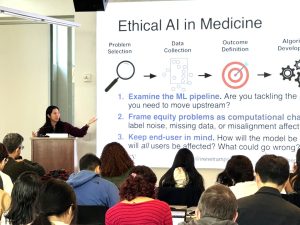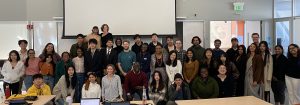Author:
Javier Kordi
 Upon entering Berkeley’s all-you-can- eat dining halls, students undergo
a strange biological transformation: their eyes seem to swell, far exceeding the size of their stomachs. Seven servings later, a tray full of half eaten entrées stares back at their defeated gazes before getting disposed of in the garbage. This propensity to waste is not limited to university dining halls. Every day, 260 million pounds of food are wasted while 50 million Americans go hungry. Witnessing this incongruity first hand, Global Poverty and Practice students Komal Ahmad, majoring in International Health and Development, and Jacquelyn Hoffman, majoring in Gender and Women’s studies, created BareAbundance—an organization that addresses the inequitable food distribution that causes millions of Americans to suffer every day.
Upon entering Berkeley’s all-you-can- eat dining halls, students undergo
a strange biological transformation: their eyes seem to swell, far exceeding the size of their stomachs. Seven servings later, a tray full of half eaten entrées stares back at their defeated gazes before getting disposed of in the garbage. This propensity to waste is not limited to university dining halls. Every day, 260 million pounds of food are wasted while 50 million Americans go hungry. Witnessing this incongruity first hand, Global Poverty and Practice students Komal Ahmad, majoring in International Health and Development, and Jacquelyn Hoffman, majoring in Gender and Women’s studies, created BareAbundance—an organization that addresses the inequitable food distribution that causes millions of Americans to suffer every day.
When food is neither consumed nor sold, or is nearing its expiration date, the organization sweeps in to intervene before it is tossed into a landfill. Receiving excess healthy food from a wide network of sources, BareAbundance redistributes this excess to people in need. Last year, BareAbundance signed a contract with Cal Dining, securing the excess foods from four dining halls and 10 on-campus cafes and restaurants. Currently, this food is being delivered to an afterschool program at New Highland School in East Oakland, where 70 percent of students are on free or reduced lunch.
Komal, one of the founders of BareAbundance, explains that the after-school program is about more than providing food; it’s also about food education. For a community lacking access to farmers’ markets, the nutritional model of the food pyramid is sometimes hard to meet. In addition to providing much-needed sustenance, the after-school program teaches “food driven values through an experiential method where [the students] consume and cook the food.”
Take one of the program’s three-day examples: children were first given donuts and asked to write about how they felt in their journals. Initially abounding with energy, the children reported stomachaches and lethargic feelings a few hours later. A similar feeling was reported the next day when the kids ate pieces of cake. On the final day, the children were given a luscious piece of fruit. They wrote in their journals that, not only did it taste good, but it also provided sustained energy without a sugar crash. This technique trains children to recognize the importance of a healthy diet through direct engagement.
Last year, BareAbundance was selected as a winner of Big Ideas @ Berkeley, a campus-wide innovation competition managed by the Blum Center. A recipient of the Social Justice and Community Engagement award, the organization received funding for transportation, food storage, website creation and publicity, allowing it to grow dramatically. Komal humbly described how the Big Ideas @ Berkeley grant “legitimized our organization…our idea.” It compelled the founders to make their model of food redistribution a reality: as Komal said, it was “both a pat on the back and a kick in the ass.” In the future, Komal hopes to establish a nation- wide food recovery network to save and distribute excess food from college campuses around the country.





